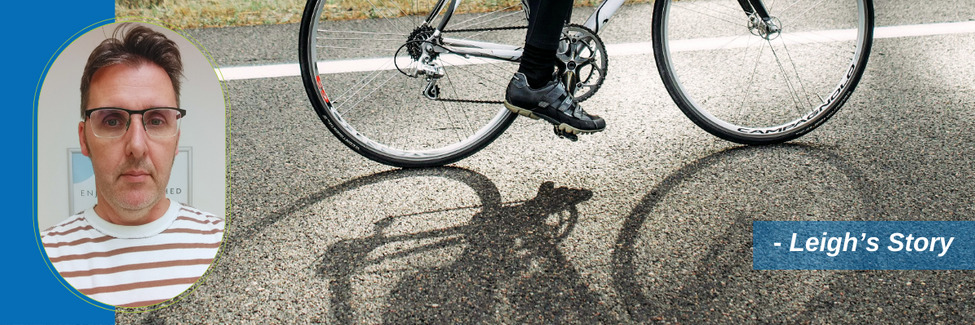In September 2020, during the Covid Pandemic, an apparently routine day unfolded for me, a family person and father of three. I took pleasure in activities such as walking, running, and frequently cycling to work. On a particularly sunny day, I opted to cycle to work, donning all necessary safety gear. As I embarked on my journey from home to the office, I encountered my daughter waiting for the school bus across the road and exchanged a wave with her. This is the last memory I have before my accident on that day. Shortly thereafter, on my way to Newbury, my bicycle collided with a pothole, throwing me onto the road with significant force. The impact resulted in a head injury, a fractured collarbone, and a broken left shoulder. My accident was promptly reported, and I was swiftly taken to the John Radcliffe Hospital in Oxford for emergency treatment.
In an unconscious state, I was admitted to the Intensive Care Unit. Upon learning of my whereabouts, the authorities visited my residence and explained to my son of the accident. Alone at home, my son was understandably frightened and promptly notified my wife, who was employed at a primary school at the time. She rushed to the hospital and received news of my condition. Subsequently, I remained in a coma, dependent on a ventilator for nearly two weeks.
Following this period, I gradually began to regain consciousness, though with limited recollection. Disoriented and unable to recognise my surroundings or identify those addressing me, I struggled to comprehend the events unfolding around me. With time, however, my awareness gradually sharpened. After my tenure at the John Radcliffe Hospital, I was transferred to the Royal Berkshire Hospital in Reading. The aftermath of the accident left me with fragmented memories, unable to recall visits from my children and other family members during my hospitalisation.
At the Royal Berkshire Hospital, I was introduced to rehabilitation sessions wherein both myself and my family were briefed on the effects of my brain injury and various strategies for recovery. While undergoing physiotherapy at the hospital, I found myself distinctly uncomfortable amidst the prevailing pandemic, yearning for the familiarity of home. Though the day of my eventual discharge arrived, my family remained apprehensive, as I was still too weak to manage my daily routines independently. I recognised my diminished strength and endeavoured to muster the energy required for tasks as mundane as dressing and washing. Resuming physiotherapy sessions at home, I wondered if I will be able to regain my former self.
While my children had their father back, I was keenly aware of my diminished energy levels, hindering my ability to engage in quality time with them. Communicating my aspirations to my Physiotherapist Laura, I expressed a desire to reclaim a bit of normalcy, including the resumption of activities such as cycling. My physiotherapy sessions facilitated improvements in balance and mobility, encouraging my determination to pursue greater fitness through any available means. Although achieving full recovery was not possible in the near future, after nearly a year, I resolved to return to work, receiving unwavering support from both my colleagues and employers during the first few months.
Returning to the workplace proved tricky, as I grappled with fatigue and an inability to concentrate on creative tasks, realising that current circumstances seemed different from my thirty-year tenure as a designer.

The evolving dynamics within the team accentuated my inability to perform at my previous level, despite gradually increasing my workload. Attempts to convey the timeframe for my recovery to my superiors proved useless, as they seemed unable to comprehend the complexities of my brain injury.
Feeling alienated within the workplace, I ultimately made the unwelcome decision to resign. Seeking solace and a fresh start, whilst at home, I actively pursued a new opportunity, and was delighted to quickly secure a significant position despite my compromised physical condition. However, I soon realised that my readiness to face the challenges of any role was incomplete. Reflecting on the profound impact my accident had on my family, I resolved to adopt a positive mindset, determined to demonstrate resilience and reclaim my former strength.
My Physiotherapist introduced me to the team at Headway Thames Valley (HTV).Their invaluable support and guidance facilitated my acceptance of my altered identity post-injury, as I discovered a community of individuals facing similar challenges.
Enrolling in HTV’s Living with Brain Injury course in November 2023 provided me with practical coping strategies and a platform for open communication with other people with brain injury.
Embracing this newfound perspective, I now acknowledge that perfection is not a prerequisite for self-worth. With renewed determination, I push the boundaries of my capabilities, embarking on activities such as playing my guitars again, short distance running, and even a little cycling too. Though occasional setbacks occur, I try to meet my own expectations.
Grateful for the unwavering support of the Headway Thames Valley team, I recognise the importance of remaining engaged and striving for normalcy post-injury.
I’ve just accepted a new job as an Interaction Designer, confident in my ability to reclaim my former professional identity. As time passes by, I eagerly anticipate returning to the creative community, armed with newfound resilience and a renewed sense of purpose.
